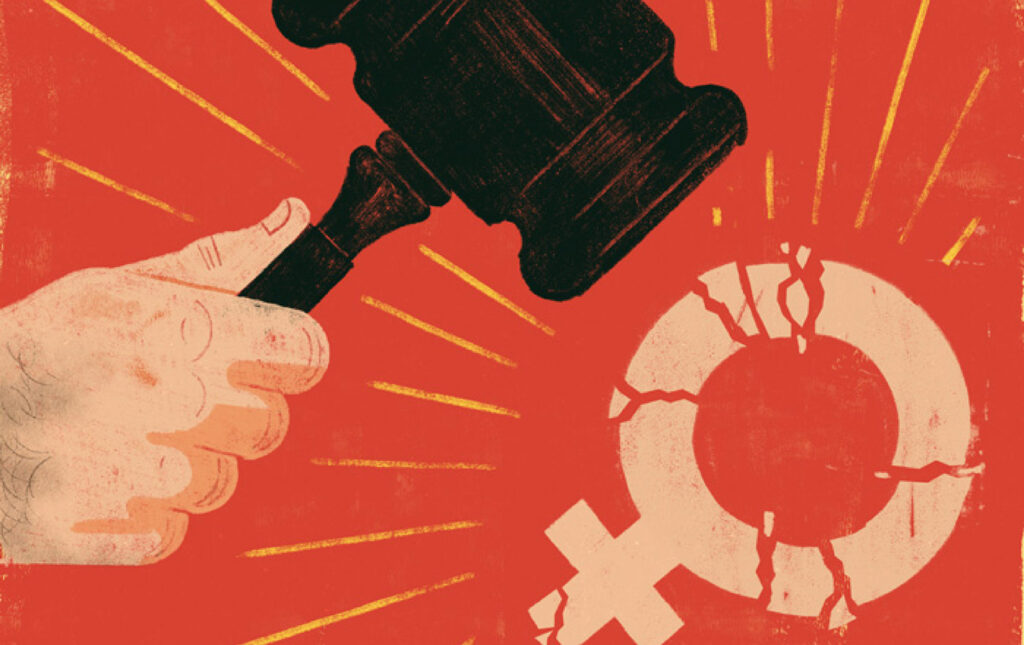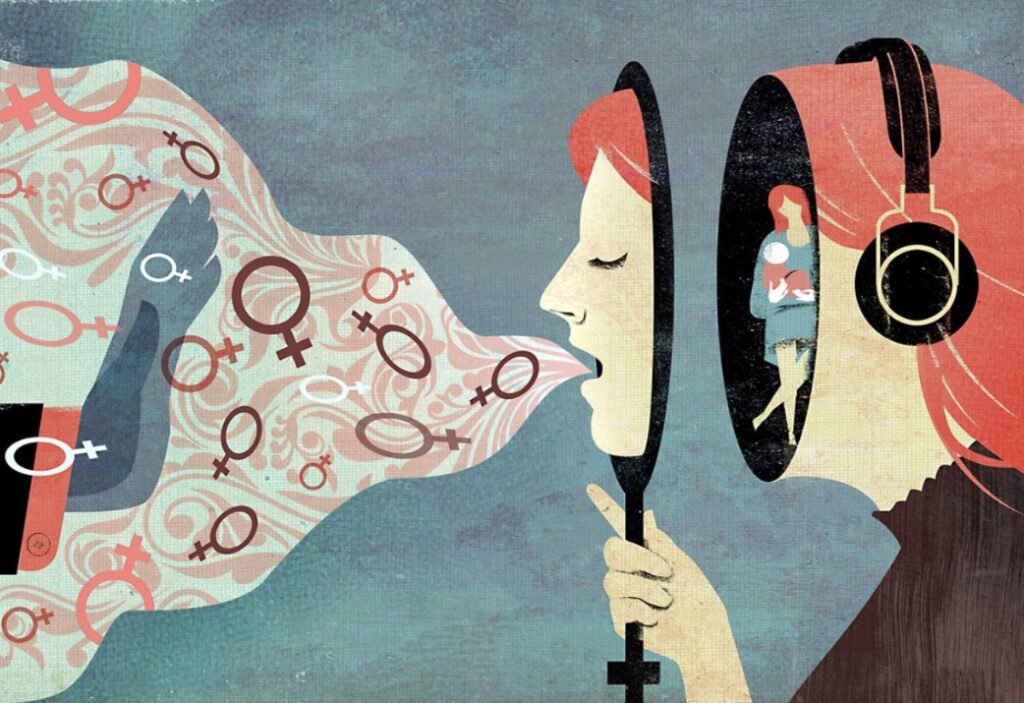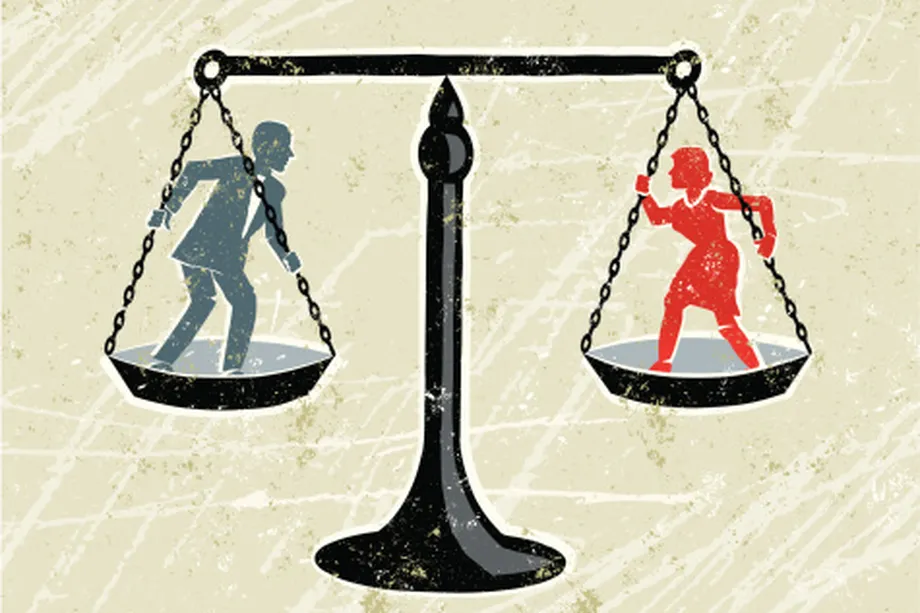By Polina Pallieraki,
World history is indisputable proof for the phrase of the ancient Greek philosopher, Heraclitus: “Everything flows”. A representative instance is the disruption of the long-standing and deeply rooted patriarchy, which has been achieved to a large extent through persistent struggles for women’s rights over the centuries and the introduction of the concept of feminism. Many oppressed female voices were, who were discriminated against because of their gender by a male person who attempted to manipulate them, given space. In point of fact, many generations were raised with the belief that the wellspring of misogyny is observed exclusively in men. And yet, we still ignore the fact that we are also unconsciously channels of misogynistic views. Under the pretext that in modern times the majority publicly supports the “girl power” movement, we disguise our thoughts that are remnants of misogyny without realizing it. Internalized misogyny is based on this fact — it contains thoughts and reflections that women have inevitably crystallized, because they are “products” of the society in which they grow up, and they promote discrimination against us in an obscure way. The insidious part of internalized misogyny is that we cannot recognize it in order to eradicate it. There are many examples that strongly demonstrate the forms of misogyny that appear in modern society, so as to make this concept tangible.
The first time I realized that I was also a victim of internalized misogyny behavior was when I received as a compliment the phrase: “you do not look like the other girls, you are not like the others”. As a minor then, I was flattered since I felt special. On second reading, I realized that this phrase implied that the female sex is cheap and that just me (or the girl) was the exception. Although I inadvertently admitted informally that female nature is characterized by shallowness. And last but not least, I wondered why some people form a negative opinion of the whole female gender based on only a few individual female behaviors, and in the second analysis, do those who generalize such views treat a girl differently?
The mentality of internalized misogyny sheds its veils mainly on social criticism, as it makes women the primary object of commentary by other women on the subject of her professional, stylistic and personal choices. For example, when a young girl is professionally established in an area controlled by male employers, we often think that she has seduced her superiors with sexual provocations (especially if she is good-looking), and not with her hard work. Otherwise, if her professional development depends on a female boss, it is rumored that with hypocritical behavior she tried to win her favor. Therefore, many times instead of appreciating a woman who is recognized for her skills in any field, especially of course in politics and in the field of entertainment due to international publicity, the female public is suspicious of her, because it assumes that the acquis came with deceit and immoral means.

The outcome of the above reasoning course is that in women beauty and professional success cannot be combined. Customarily, we are negatively biased towards the spiritual being of an impressive girl. For some inexplicable reason (which probably has its roots in misogyny, internalized or not), the view that the particularly striking appearance allows a woman only to get jobs that promote her or need her -for instance as a decorator- and not to something scientific, or whatever requires some mental expertise. In general, we tend to associate beauty with spiritual shallowness – one of the greatest social injustices that can be suffered not only by a woman but also by every human being.
There is a significant impact of internalized misogyny on aesthetic preferences, as it places feminine tastes in limited molds and, consequently, flattens our acceptance of ourselves. A distressing example of the news is the statements of Aphrodite Latinopoulou, who publicly sparked the promotion of female hair growth on social media. I do not know how many people will be shocked by the following revelation, but women also get hair in almost all parts of their body. The depilated skin is the result of our intervention, something that obviously all women know. And that is why we should not be impressed at the existence of hair growth in our homosexuals should not seem unsightly. Similarly, if a woman wants to get rid of her hair, or generally take care of even the simplest occasion or make cosmetic, corrective interventions, she should not be denoted as vain or insecure by the rest. More often than not, a woman’s aesthetic attire, whether sloppy or neat, is the target of negative comments from a large portion of their homosexuals.
Of course, the fact that women are constantly judged on their sex life, and to some extent, we do it unconsciously even without saying it, can not unnoticed. Has it ever crossed your mind, even vaguely, that when an acquaintance of yours changed a partner in a short period of time, she was “looking” or is she immoral or overly liberated? Most of us will probably answer in the affirmative. The fact that coincidences like this happened in her life is not often our first thought. Unfortunately, in many cases, the guilt of women’s sexual desire due to anachronistic remnants still prevails. Similarly, if an adult does not seem to have a love life, we often consider it unnatural and problematic. The existence and survival of the term “granddaughter” are not accidental. Everyone’s sex life is strictly their personal affair and they should be encouraged by their homosexuals to do whatever pleases her, as long as she obviously follows some fundamental moral rules.

Consequently, in the year 2021, the lack of desire for motherhood should not cause a stir in the rest of us, nor should any woman of any age be socially pressured to start a family. After all, happiness has no prescription and many women do not end up with motherhood. Questions like, “when will you have a child?” are the most inelegant. On the contrary, paternity is very seldom commented on.
Ultimately, interiorized misogyny is often reflected in sexual intercourse. A negligible percentage of women focus exclusively on satisfying the needs of their sexual partner and once this is achieved, the love process ends. We do not claim our own climax or even if we guide our partner, we resort to the pretense of the feeling of pleasure so that he does not “suffer” or is disappointed. In essence, we deprive ourselves of an important part of sexual pleasure on our own initiative and, at the same time, manufacture illusions in our partner.
In summary, almost all of us have once been victims of internalized misogyny, we have thought over and over again whether we are being misrepresented by others, we have wronged ourselves in many cases because we were born, felt, or became women. Let each one of them try to put a little stone in the elimination of these stereotypes so that the succeeding generations of women can support each other even more effectively!
References
- Τι είναι ο εσωτερικευμένος μισογυνισμός;, kamenasoutien, Available here




